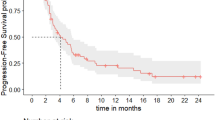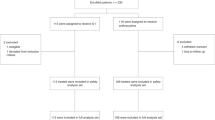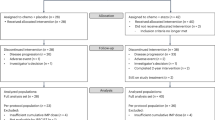Abstract
Adjuvant use of anthracycline–taxane combination therapy is an accepted strategy in the management of high-risk early-stage breast cancer. However, the introduction of this regimen raises the question of how best to manage those patients who relapse following adjuvant therapy, and whether there is a role for rechallenging in the metastatic setting with the same agent, or class of agent, that has been utilized in the adjuvant setting. This Review examines the evidence for rechallenging with both anthracyclines and taxanes, and highlights the issues that need to be examined in the context of future clinical trials.
Key Points
-
Rechallenge is not a new concept in oncology, and has been used to good effect in other tumors
-
A systematic review in breast cancer has revealed a body of literature relating to rechallenging with anthracyclines and taxanes
-
Current evidence to support rechallenge in the metastatic setting is limited
-
Some taxane studies that are actively recruiting allow inclusion of patients with previous taxane exposure; this could potentially have a deleterious effect on any efficacy analysis
-
Prospective, randomized trials are required to address the clinical utility of rechallenge, and to determine whether it is an appropriate strategy in the metastatic setting
This is a preview of subscription content, access via your institution
Access options
Subscribe to this journal
Receive 12 print issues and online access
$209.00 per year
only $17.42 per issue
Buy this article
- Purchase on Springer Link
- Instant access to full article PDF
Prices may be subject to local taxes which are calculated during checkout
Similar content being viewed by others
References
O'Shaughnessy, J., Twelves, C. & Aapro, M. Treatment for anthracycline-pretreated metastatic breast cancer. Oncologist 7 (Suppl. 6), 4–12 (2002).
Martín, M. et al. Doxorubicin in combination with fluorouracil and cyclophosphamide (i.v. FAC regimen, day 1, 21) versus methotrexate in combination with fluorouracil and cyclophosphamide (i.v. CMF regimen, day 1, 21) as adjuvant chemotherapy for operable breast cancer: a study by the GEICAM group. Ann. Oncol. 14, 833–842 (2003).
Early Breast Cancer Trialists' Collaborative Group (EBCTCG). Effects of chemotherapy and hormonal therapy for early breast cancer on recurrence and 15-year survival: an overview of the randomised trials. Lancet 365, 1687–1717 (2005).
Henderson, I. C. et al. Improved outcomes from adding sequential paclitaxel but not from escalating doxorubicin dose in an adjuvant chemotherapy regimen for patients with node-positive primary breast cancer. J. Clin. Oncol. 21, 976–983 (2003).
Mamounas, E. P. et al. Paclitaxel after doxorubicin plus cyclophosphamide as adjuvant chemotherapy for node-positive breast cancer: results from NSABP B-28. J. Clin. Oncol. 23, 3686–3696 (2005).
Roché, H. et al. Sequential adjuvant epirubicin-based and docetaxel chemotherapy for node-positive breast cancer patients: the FNCLCC PACS 01 trial. J. Clin. Oncol. 24, 5664–5671 (2006).
Francis, P. et al. Adjuvant chemotherapy with sequential or concurrent anthracycline and docetaxel: Breast International Group 02-98 randomized trial. J. Natl Cancer Inst. 100, 121–133 (2008).
Martín, M. et al. Randomized phase 3 trial of fluorouracil, epirubicin, and cyclophosphamide alone or followed by paclitaxel for early breast cancer. J. Natl Cancer Inst. 100, 805–814 (2008).
Fountzilas, G. et al. Postoperative dose-dense sequential chemotherapy with epirubicin, followed by CMF with or without paclitaxel, in patients with high-risk operable breast cancer: a randomized phase III study conducted by the Hellenic Cooperative Oncology Group. Ann. Oncol. 16, 1762–1771 (2005).
Goldstein, L. J. et al. Concurrent doxorubicin plus docetaxel is not more effective than concurrent doxorubicin plus cyclophosphamide in operable breast cancer with 0 to 3 positive axillary nodes: North American Breast Cancer Intergroup Trial E 2197. J. Clin. Oncol. 26, 4092–4099 (2008).
Ellis, P. et al. Sequential docetaxel as adjuvant chemotherapy for early breast cancer (TACT): an open-label, phase III, randomised controlled trial. Lancet 373, 1681–1692 (2009).
De Laurentiis, M. et al. Taxane-based combinations as adjuvant chemotherapy of early breast cancer: a meta-analysis of randomized trials. J. Clin. Oncol. 26, 44–53 (2008).
Seidman, A. D., O'Shaughnessy, J. & Misset, J. L. Single-agent capecitabine: a reference treatment for taxane-pretreated metastatic breast cancer? Oncologist 7 (Suppl. 6), 20–28 (2002).
Thomas, E. S. et al. Ixabepilone plus capecitabine for metastatic breast cancer progressing after anthracycline and taxane treatment. J. Clin. Oncol. 25, 5210–5217 (2007).
Perez, E. A. Gemcitabine and platinum combinations in patients with breast cancer previously treated with anthracyclines and/or taxanes. Clin. Breast Cancer 4 (Suppl. 3), S113–S116 (2004).
Carrick, S., Ghersi, D., Wilcken, N. & Simes, J. Platinum containing regimens for metastatic breast cancer. Cochrane Database Syst. Rev. 3, CD003374 (2004).
Zelek, L. et al. Weekly vinorelbine is an effective palliative regimen after failure with anthracyclines and taxanes in metastatic breast carcinoma. Cancer 92, 2267–2272 (2001).
Martín, M. et al. Gemcitabine plus vinorelbine versus vinorelbine monotherapy in patients with metastatic breast cancer previously treated with anthracyclines and taxanes: final results of the phase III Spanish Breast Cancer Research Group (GEICAM) trial. Lancet Oncol. 8, 219–225 (2007).
O'Byrne, K. J. et al. Cyclophosphamide, methotrexate and infusional 5-fluorouracil (infusional CMF) in metastatic breast cancer. Br. J. Cancer 77, 1950–1956 (1998).
Geyer, C. E. et al. Lapatinib plus capecitabine for HER2-positive advanced breast cancer. N. Engl. J. Med. 355, 2733–2743 (2006).
Miller, K. D. et al. Randomized phase III trial of capecitabine compared with bevacizumab plus capecitabine in patients with previously treated metastatic breast cancer. J. Clin. Oncol. 23, 792–799 (2005).
Von Hoff, D. D. et al. Risk factors for doxorubicin-induced congestive heart failure. Ann. Intern. Med. 91, 710–717 (1979).
Ryberg, M. et al. Cardiotoxicity: an analysis of 469 patients with metastatic breast cancer. J. Clin. Oncol. 16, 3502–3508 (1998).
Seltzer, V., Vogl, S. & Kaplan, B. Recurrent ovarian carcinoma: retreatment utilizing combination chemotherapy including cis-diamminedichloroplatinum in patients previously responding to this agent. Gynecol. Oncol. 21, 167–176 (1985).
Fisher, R. I., DeVita, V. T., Hubbard, S. P., Simon, R. & Young, R. C. Prolonged disease-free survival in Hodgkin's disease with MOPP reinduction after first relapse. Ann. Intern. Med. 90, 761–763 (1979).
Vincent, M., Evans, B. & Smith, I. First-line chemotherapy rechallenge after relapse in small cell lung cancer. Cancer Chemother. Pharmacol. 21, 45–48 (1988).
Batist, G. et al. Small-cell carcinoma of lung: reinduction therapy after late relapse. Ann. Intern. Med. 98, 472–474 (1983).
Langley, R. E. et al. Phase III trial of epirubicin plus paclitaxel compared with epirubicin plus cyclophosphamide as first-line chemotherapy for metastatic breast cancer: United Kingdom National Cancer Research Institute trial AB01. J. Clin. Oncol. 23, 8322–8330 (2005).
Fountzilas, G. et al. Dose-dense sequential chemotherapy with epirubicin and paclitaxel versus the combination, as first-line chemotherapy, in advanced breast cancer: a randomized study conducted by the Hellenic Cooperative Oncology Group. J. Clin. Oncol. 19, 2232–2239 (2001).
Fountzilas, G. et al. Paclitaxel and epirubicin versus paclitaxel and carboplatin as first-line chemotherapy in patients with advanced breast cancer: a phase III study conducted by the Hellenic Cooperative Oncology Group. Ann. Oncol. 15, 1517–1526 (2004).
Pierga, J. Y. et al. Effect of adjuvant chemotherapy on outcome in patients with metastatic breast carcinoma treated with first-line doxorubicin-containing chemotherapy. Cancer 91, 1079–1089 (2001).
Kardinal, C. G. et al. Responses to chemotherapy or chemohormonal therapy in advanced breast cancer patients treated previously with adjuvant chemotherapy. A subset analysis of CALGB Study 8081. Cancer 61, 415–419 (1988).
Gennari, A. et al. Activity of first-line epirubicin and paclitaxel in metastatic breast cancer is independent of type of adjuvant therapy. Br. J. Cancer 90, 962–967 (2004).
Buzdar, A. U. et al. Management of breast cancer patients failing adjuvant chemotherapy with adriamycin-containing regimens. Cancer 47, 2798–2802 (1981).
Venturini, M. et al. Effect of adjuvant chemotherapy with or without anthracyclines on the activity and efficacy of first-line cyclophosphamide, epidoxorubicin, and fluorouracil in patients with metastatic breast cancer. J. Clin. Oncol. 14, 764–773 (1996).
Pacilio, C. et al. Is epirubicin effective in first-line chemotherapy of metastatic breast cancer (MBC) after an epirubicin-containing adjuvant treatment? A single centre phase III trial. Br. J. Cancer 94, 1233–1236 (2006).
Yonemori, K. et al. Prediction of response to repeat utilization of anthracycline in recurrent breast cancer patients previously administered anthracycline-containing chemotherapeutic regimens as neoadjuvant or adjuvant chemotherapy. Breast Cancer Res. Treat. 103, 313–318 (2007).
Falkson, G., Gelman, R., Glick, J., Falkson, C. I. & Harris, J. Reinduction with the same cytostatic treatment in patients with metastatic breast cancer: an Eastern Cooperative Oncology Group study. J. Clin. Oncol. 12, 45–49 (1994).
Bastholt, L. et al. Dose-response relationship of epirubicin in the treatment of postmenopausal patients with metastatic breast cancer: a randomized study of epirubicin at four different dose levels performed by the Danish Breast Cancer Cooperative Group. J. Clin. Oncol. 14, 1146–1155 (1996).
Yap, H. Y. et al. Dihydroxyanthracenedione: a promising new drug in the treatment of metastatic breast cancer. Ann. Intern. Med. 95, 694–697 (1981).
Bezwoda, W. R., Dansey, R. & Seymour, L. High-dose 4′-epiadriamycin for the treatment of breast cancer refractory to standard dose anthracycline chemotherapy: achievement of second responses. Oncology 47, 4–8 (1990).
Catimel, G. et al. FAC (fluorouracil, doxorubicin, cyclophosphamide) as second line chemotherapy in patients with metastatic breast cancer progressing under FEC (fluorouracil, epirubicin, cyclophosphamide) chemotherapy. Ann. Oncol. 5, 95–97 (1994).
Stöger, H. et al. A phase II trial of weekly high-dose folinic acid and 5-fluorouracil in combination with epirubicin as salvage chemotherapy in advanced breast cancer. Oncology 51, 518–522 (1994).
Rozencweig, M. et al. Randomized phase II trial of carminomycin versus 4′-epidoxorubicin in advanced breast cancer. J. Clin. Oncol. 2, 275–281 (1984).
Luikart, S. D., Witman, G. B. & Portlock, C. S. Adriamycin (doxorubicin), vinblastine, and mitomycin C combination chemotherapy in refractory breast carcinoma. Cancer 54, 1252–1255 (1984).
Neidhart, J. A., Gochnour, D., Roach, R., Hoth, D. & Young, D. A comparison of mitoxantrone and doxorubicin in breast cancer. J. Clin. Oncol. 4, 672–677 (1986).
Henderson, I. C. et al. Randomized clinical trial comparing mitoxantrone with doxorubicin in previously treated patients with metastatic breast cancer. J. Clin. Oncol. 7, 560–571 (1989).
Bontenbal, M. et al. Doxorubicin vs epirubicin, report of a second-line randomized phase II/III study in advanced breast cancer. EORTC Breast Cancer Cooperative Group. Br. J. Cancer 77, 2257–2263 (1998).
Brun, B. et al. Response to second-line chemotherapy in patients with metastatic breast carcinoma previously responsive to first-line treatment. Cancer 79, 2137–2146 (1997).
Porkka, K., Blomqvist, C., Rissanen, P., Elomaa, I. & Pyrhönen, S. Salvage therapies in women who fail to respond to first-line treatment with fluorouracil, epirubicin, and cyclophosphamide for advanced breast cancer. J. Clin. Oncol. 12, 1639–1647 (1994).
Hortobagyi, G. N. et al. A comparative study of doxorubicin and epirubicin in patients with metastatic breast cancer. Am. J. Clin. Oncol. 12, 57–62 (1989).
Jones, A. L. et al. Phase II study of continuous infusion fluorouracil with epirubicin and cisplatin in patients with metastatic and locally advanced breast cancer: an active new regimen. J. Clin. Oncol. 16, 1259–1265 (1994).
Giotta, F. et al. Liposomal-encapsulated doxorubicin plus cyclophosphamide as first-line therapy in metastatic breast cancer: a phase II multicentric study. Ann. Oncol. 18 (Suppl. 6), vi66–vi69 (2007).
Harris, L. et al. Liposome-encapsulated doxorubicin compared with conventional doxorubicin in a randomized, multicenter trial of metastatic breast carcinoma. Cancer 94, 25–36 (2002).
Batist, G. et al. Reduced cardiotoxicity and preserved antitumor efficacy of liposome-encapsulated doxorubicin and cyclophosphamide compared with conventional doxorubicin and cyclophosphamide in a randomized, multicenter trial of metastatic breast cancer. J. Clin. Oncol. 19, 1444–1454 (2001).
Batist, G., Harris, L., Azarnia, N., Lee, L. W. & Daza-Ramirez, P. Improved anti-tumor response rate with decreased cardiotoxicity of non-pegylated liposomal doxorubicin compared with conventional doxorubicin in first-line treatment of metastatic breast cancer in patients who had received prior adjuvant doxorubicin: results of a retrospective analysis. Anticancer Drugs 17, 587–595 (2006).
O'Brien, M. E. et al. Reduced cardiotoxicity and comparable efficacy in a phase III trial of pegylated liposomal doxorubicin HCl (Caelyx/Doxil) versus conventional doxorubicin for first-line treatment of metastatic breast cancer. Ann. Oncol. 15, 440–449 (2004).
Sparano, J. A. et al. Pegylated liposomal doxorubicin plus docetaxel significantly improves time to progression without additive cardiotoxicity compared with docetaxel monotherapy in patients with advanced breast cancer previously treated with neoadjuvant-adjuvant anthracycline therapy: results from a randomized phase III study. J. Clin. Oncol. 27, 4522–4529 (2009).
Trudeau, M. E. et al. Phase II multicenter trial of anthracycline rechallenge with pegylated liposomal doxorubicin plus cyclophosphamide for first-line therapy of metastatic breast cancer previously treated with adjuvant anthracyclines. J. Clin. Oncol. 27, 5906–5910 (2009).
Rivera, E. et al. Phase II study of pegylated liposomal doxorubicin in combination with gemcitabine in patients with metastatic breast cancer. J. Clin. Oncol. 21, 3249–3254 (2003).
Lyass, O. et al. Correlation of toxicity with pharmacokinetics of pegylated liposomal doxorubicin (Doxil) in metastatic breast carcinoma. Cancer 89, 1037–1047 (2000).
Keller, A. M. et al. Randomized phase III trial of pegylated liposomal doxorubicin versus vinorelbine or mitomycin C plus vinblastine in women with taxane-refractory advanced breast cancer. J. Clin. Oncol. 22, 3893–3901 (2004).
Martin, M. et al. Phase II study of pegylated liposomal doxorubicin plus vinorelbine in breast cancer with previous anthracycline exposure. Clin. Breast Cancer 5, 353–357 (2004).
Chow, L. W., Yip, A. Y. & Lang, B. H. A phase II trial of vinorelbine and pegylated liposomal doxorubicin in patients with pretreated metastatic breast cancer. Am. J. Clin. Oncol. 30, 133–138 (2007).
Al-Batran, S. E. et al. The clinical benefit of pegylated liposomal doxorubicin in patients with metastatic breast cancer previously treated with conventional anthracyclines: a multicentre phase II trial. Br. J. Cancer 94, 1615–1620 (2006).
Fabi, A. et al. Pegylated liposomal doxorubicin in combination with gemcitabine: a phase II study in anthracycline-naive and anthracycline pretreated metastatic breast cancer patients. Cancer Chemother. Pharmacol. 57, 615–623 (2006).
Seidman, A. D. et al. Ninety-six-hour paclitaxel infusion after progression during short taxane exposure: a phase II pharmacokinetic and pharmacodynamic study in metastatic breast cancer. J. Clin. Oncol. 14, 1877–1884 (1996).
Perez, E. A., Vogel, C. L., Irwin, D. H., Kirshner, J. J. & Patel, R. Multicenter phase II trial of weekly paclitaxel in women with metastatic breast cancer. J. Clin. Oncol. 19, 4216–4223 (2001).
Taguchi, T. et al. Phase II study of weekly paclitaxel for docetaxel-resistant metastatic breast cancer in Japan. Breast J. 10, 509–513 (2004).
Yonemori, K. et al. Efficacy of weekly paclitaxel for docetaxel-resistant metastatic breast cancer. Breast Cancer Res. Treat. 89, 237–241 (2005).
Blum, J. L. et al. Phase II study of weekly albumin-bound paclitaxel for patients with metastatic breast cancer heavily pretreated with taxanes. Clin. Breast Cancer 7, 850–856 (2007).
Valero, V. et al. A phase II study of docetaxel in patients with paclitaxel-resistant metastatic breast cancer. J. Clin. Oncol. 16, 3362–3368 (1998).
Lin, Y. C., Chang, H. K., Wang, C. H., Chen, J. S. & Liaw, C. C. Single-agent docetaxel in metastatic breast cancer patients pre-treated with anthracyclines and paclitaxel: partial cross resistance between paclitaxel and docetaxel. Anticancer Drugs 11, 617–621 (2000).
Miller, K. et al. Paclitaxel plus bevacizumab versus paclitaxel alone for metastatic breast cancer. N. Engl. J. Med. 357, 2666–2676 (2007).
Gray, R., Bhattacharya, S., Bowden, C., Miller, K. & Comis, R. L. Independent review of E2100: a phase III trial of bevacizumab plus paclitaxel versus paclitaxel in women with metastatic breast cancer. J. Clin. Oncol. 27, 4966–4972 (2009).
Miles, D. et al. Phase III study of bevacizumab with docetaxel or docetaxel with placebo for the first line treatment of human epidermal growth factor receptor-2 negative metastatic breast cancer (mBC). J. Clin. Oncol. 28, 3239–3247 (2010).
Katsumata, N. et al. Phase III trial of doxorubicin plus cyclophosphamide (AC), docetaxel, and alternating AC and docetaxel as front-line chemotherapy for metastatic breast cancer: Japan Clinical Oncology Group trial (JCOG9802). Ann. Oncol. 20, 1210–1215 (2009).
U. S. National Institute of Health database of clinical trials [online].
Author information
Authors and Affiliations
Contributions
C. Palmieri and J. Krell are equal first authors on this manuscript. All authors contributed to the research, discussion, writing and editing of this Review.
Corresponding author
Ethics declarations
Competing interests
C. Palmieri acts as a consultant for Cephalon. D. Miles acts as a consultant for Roche. The other authors declare no competing interests.
Supplementary information
Supplementary Text
Identifying patients who are likely to benefit from rechallenge; Cardiotoxicity of rechallenging with conventional anthracycline-containing regimens; Neurotoxicity of rechallenging with taxane-containing regimens; Overview of the potential efficacy of rechallenging with anthracyclines and taxane; Active clinical trials which allow prior taxane exposure (DOC 58 kb)
Supplementary Table 1
Anthracycline rechallenge (DOC 103 kb)
Supplementary Table 2
Efficacy of liposomal anthracycline-containing regimens (DOC 91 kb)
Supplementary Table 3
Cardiotoxicity in patients rechallenged with an anthracycline or anthracenedione (DOC 69 kb)
Supplementary Table 4
Taxane rechallenge (DOC 75 kb)
Supplementary Table 5
Incidence of neurotoxicity following taxane rechallenge (DOC 52 kb)
Rights and permissions
About this article
Cite this article
Palmieri, C., Krell, J., James, C. et al. Rechallenging with anthracyclines and taxanes in metastatic breast cancer. Nat Rev Clin Oncol 7, 561–574 (2010). https://doi.org/10.1038/nrclinonc.2010.122
Published:
Issue Date:
DOI: https://doi.org/10.1038/nrclinonc.2010.122
This article is cited by
-
Long non-coding RNAs as the critical regulators of PI3K/AKT, TGF-β, and MAPK signaling pathways during breast tumor progression
Journal of Translational Medicine (2023)
-
Drug-tolerant persister cells in cancer: the cutting edges and future directions
Nature Reviews Clinical Oncology (2023)
-
Long non-coding RNAs as the critical regulators of doxorubicin resistance in tumor cells
Cellular & Molecular Biology Letters (2021)
-
Exploring chemotherapy holiday and drugs re-challenge in advanced pancreatic cancer patients
Cancer Chemotherapy and Pharmacology (2021)
-
Predictors of new-onset heart failure and overall survival in metastatic breast cancer patients treated with liposomal doxorubicin
Scientific Reports (2020)



